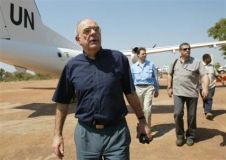UN envoy sees 60 pct south Sudan peace chance- paper
AMSTERDAM, Dec 13 (Reuters) – The U.N. envoy in Sudan estimates there is a 60 percent chance a peace deal will be signed in the country’s south by Dec. 31, ending Africa’s longest civil war, according to a newspaper interview on Monday.
 Sudan’s government and the rebel Sudan People’s Liberation Army/Movement (SPLA/M) face a year-end deadline to negotiate an end to Sudan’s 21-year war.
Sudan’s government and the rebel Sudan People’s Liberation Army/Movement (SPLA/M) face a year-end deadline to negotiate an end to Sudan’s 21-year war.
“I estimate the chance that both parties sign (an agreement) before the end of the year at 60 percent,” U.N. envoy Jan Pronk was quoted by Dutch daily De Volkskrant as saying.
“The atmosphere is good and there are no structural reasons for further postponement. Of course international support remains necessary,” he said.
The war, which has killed 2 million people, broadly pits the Islamist, Arabic-speaking government in the north against rebels seeking greater autonomy for the animist and Christian south. Oil, ethnicity and ideology have complicated the conflict.
Both sides have made substantial progress towards a peace deal, but dates for a final agreement have repeatedly slipped since 2003, with issues over funding SPLA/M forces and payment of lucrative oil revenues to the south yet to be resolved.
Pronk said the last stumbling block was how to create a new national army which included the rebels of the south.
Should a peace deal succeed, Pronk was cited as saying, it would have “much impact” on the conflict in the western Darfur region, which has triggered what the U.N. calls the world’s worst humanitarian crisis.
“The rebels in Darfur would then be confronted with a government of national unity. They would have to negotiate with their opponents as well as their supporters”, he said. The SPLA currently supports the largest rebel group in Darfur.
About 1.6 million Darfuris have fled their homes since February 2003 for fear of attack by Arab militiamen mobilised by the government.
“It would show that it is possible, that it has worked. Elements from the South’s peace process, such as regional autonomy and a fairer distribution natural resources, could also be applied in Darfur,” Pronk said.
